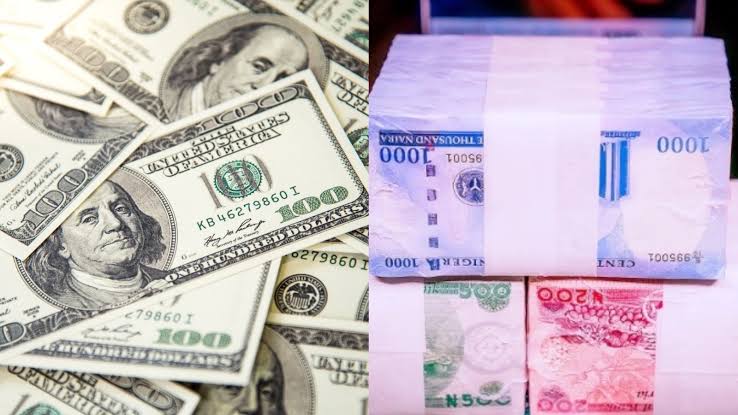What is the Dollar to Naira Exchange rate at the black market also known as the parallel market (Aboki fx)?
See the black market Dollar to Naira exchange rate, Euro to Naira black market, Pounds to Naira black market for April 23, 2024, below. You can swap your dollar for Naira at these rates.
How much is a dollar to naira today in the black market?
Dollar to naira exchange rate today black market (Aboki dollar rate):
The exchange rate for a dollar to naira at Lagos, Abuja and Port Harcourt Parallel Market (Black Market) yesterday closed at an average N1,233 per dollar according to data obtained from Bureau De Change (BDC) operators.
CBN Sacks 50 More Staff, Sparking Anxiety Among Employees
Dollar to Naira Black Market Rate Today.
How much is $1 in Nigeria black market today?
CBN exchange rate dollar to Naira today
The CBN exchange rate dollar to Naira today is:
The Dollar to Naira Bank rate today is also the same as the CBN official rate. The only difference is just one to two naira difference from one bank to another.
Please note that the Central Bank of Nigeria (CBN) does not recognize the parallel market (black market), as it has directed individuals who want to engage in Forex to approach their respective banks.
The rates you buy or sell forex at Aboki exchange rate today in Lagos and other Aboki Forex rates may be different from what is captured in this article because prices vary.
Pounds to Naira Today
Pounds to NGN CBN Rate Today
- Buying Rate: N1,500
- Selling Rate: N1,550
Euro to Naira black market Today
Euro to Naira exchange rate Today
- Buying Rate: N1,300
- Selling Rate: N1,350
Meanwhile, at the Lagos Parallel Market, popularly referred to as the Black Market, the exchange rate between the US dollars and the Naira concluded at 1650 per dollar yesterday, as reported by sources in the Bureau De Change (BDC).
Nwabali Breaks Silence On Union Saint-Gilloise Transfer Rumours
Swiss Franc and Yen Gain, but Ease as Iran and Israel Ease Tensions
The Swiss franc and Japanese yen, considered safe-haven currencies, saw modest gains on Friday before retracting slightly following signals from Iran indicating no immediate retaliation against Israel. This development came after Israel’s reported limited-scale attack on Iran overnight, initially sparking market concerns.
Following the news of Israel’s action, both the Swiss franc and Japanese yen surged against other currencies, although their momentum slowed later in the day. The dollar fell by 0.2% against the Swiss franc to 0.91 franc and dropped to a two-week low of 0.9011 franc overnight after Israel’s move. Against the yen, the dollar slid to 154.57 yen, down slightly from its initial dip to 153.59 yen after the news.
Iranian media reported a limited number of explosions in Isfahan, central Iran, allegedly caused by air defenses intercepting drones. However, senior Iranian officials conveyed to Reuters that there were no immediate plans for retaliation against Israel.
Eugene Epstein, Head of Structuring for North America at Moneycorp in New Jersey, commented on the market reaction, stating, “The market initially reacted poorly because of the premise of an Israel response.” However, he noted that Iran’s current stance was perceived as a de-escalation, prompting a reversal of market movements.
Israel’s attack on Iran reportedly followed an earlier assault by Iran on Israel, believed to be in response to a suspected Israeli strike on its consulate in Syria. The news initially triggered a sell-off in risk assets, leading to increased oil and gold prices, as well as a rally in U.S. Treasuries and safe-haven currencies.
Despite the geopolitical tensions, currency markets remained volatile, with the euro initially falling but stabilizing at $1.0648 in late-afternoon trading. Sterling also experienced a decline, falling to $1.2370.
The overarching focus for investors in recent weeks has been on the Federal Reserve’s monetary policy and economic data. Strong U.S. economic indicators, particularly March’s inflation rate of 3.5%, have tempered expectations of interest rate cuts by the Fed, leading to increased U.S. bond yields and a stronger dollar.
Boris Kovacevic, Global Market Strategist at Convera in Vienna, Austria, emphasized, “Investors are still focused on the Fed mainly, instead of geopolitics.” This sentiment aligns with the broader theme of prolonged higher U.S. rates.
Asian currencies, however, faced pressure, prompting finance chiefs from the United States, Japan, and South Korea to issue a rare joint warning over sliding exchange rates. Bank of Japan Governor Kazuo Ueda hinted at potential interest rate adjustments depending on currency fluctuations during the upcoming BOJ monetary policy meeting.
Japanese Finance Minister Shunichi Suzuki reiterated warnings against excessive yen depreciation, signaling a willingness to intervene in currency markets if necessary.
In the realm of cryptocurrencies, bitcoin experienced a 1.1% increase to $64,287 ahead of the anticipated halving event. Bitcoin halving refers to a technical adjustment reducing the rate of new coin creation within its code.
Stay informed with Ejes Gist News – Your Source for Credible Naija News Today, latest naija gists today and Breaking News in Nigeria Now.







